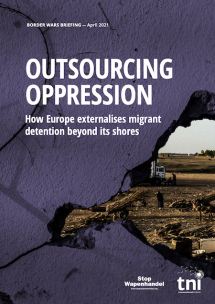Ideas into movement
Boost TNI's work
50 years. Hundreds of social struggles. Countless ideas turned into movement.
Support us as we celebrate our 50th anniversary in 2024.

This report seeks to join the dots between Europe’s outsourcing of migrant detention to third countries and the notoriously poor conditions in those migrant detention centres. Europe calls the shots on migrant detention beyond its shores but is rarely held to account for the deeply oppressive consequences, including arbitrary detention, torture, forced disappearance, violence, sexual violence, and death.
